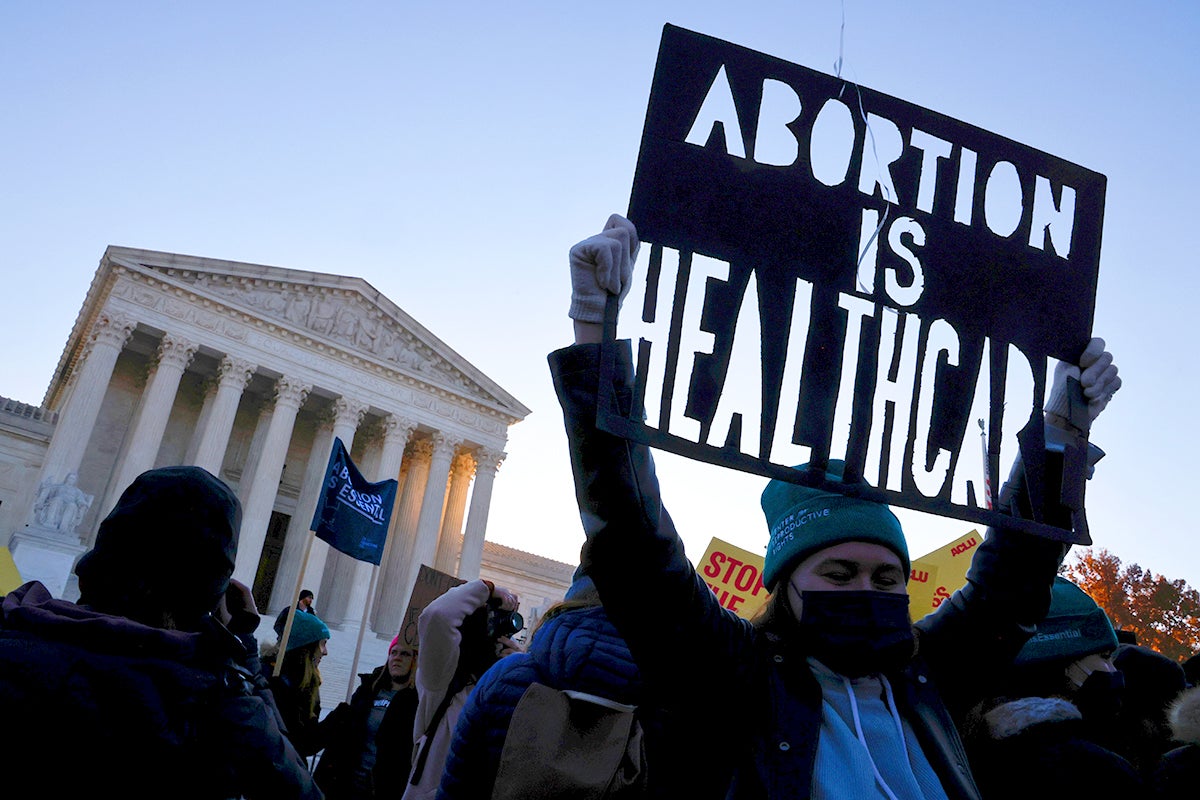Will Supreme Court survive the ‘stench’ of politics in abortion case? What overturning Roe v Wade would look like
From state-level bans to long distances to access abortion, Eric Garcia looks at the potential impact of the Supreme Court gutting Roe v Wade


If the Supreme Court effectively nullifies Roe v Wade, the landmark 1973 Supreme Court decision that enshrined the right to an abortion, people seeking the procedure may lose access altogether depending where they live in the US.
The prospect is no longer hypothetical. On Wednesday, the US Supreme Court heard a case regarding Mississippi’s law that bans most abortions after banning most abortions after 15 weeks. Depending on how the court rules, it is entirely possible that Roe v Wade could be struck down.
According to the Guttmacher Institute, a pro-abortion rights research organisation, if Roe were to be weakened or overturned, a total of 26 states are either certain or likely to ban abortion. Some states would do this either through a “Pre-Roe ban” – laws that banned abortion before the 1973 ruling but were never taken off the books – or a “trigger ban”, which is to say a law that is designed to take effect in the event Roe were overturned. Currently, 12 states have a “trigger ban” and nine states have a pre-Roe ban.
But these aren’t the only ways that abortion access could be severely limited, according to the institute. Five states currently have a near-total ban, but many are blocked by court order, while 11 states have a six-week ban that are not in effect. Texas’ strict six-week abortion ban is currently in effect. Furthermore, Missouri has an eight-week ban and four state constitutions ban the right to an abortion, the Guttmacher Institute found. Some states have multiple bans in place.
It’s not just the states where bans are already in place that could see access to safe abortions curtailed. Guttmacher noted how five states – Florida, Indiana, Wyoming, Nebraska and Montana – are all likely to pass some form of abortion ban if Roe were overturned. All five states have Republican governors.
Additionally, a number of states could elect Republican governors, or the GOP could flip state legislatures in next year’s midterms. The nonpartisan Cook Political Report considers two gubernatorial races where the incumbent is a Democrat as “toss-ups” and an emboldened GOP in those states could be compelled to pass restrictions or outright bans.
State bans are not the only major barrier to abortion access. The overturning of Roe could mean that the average American would have to travel 125 miles to access an abortion, according to information from the Myers Abortion Facility database that Axios reported on Wednesday. That is compared to the current average of 25 miles, and overturning Roe would increase the number of people living 100 miles away from an abortion facility from one per cent to 29 per cent.
Furthermore, it is not likely that Congress could take action on abortion if Roe were overturned. House Democrats passed legislation that would codify Roe in September in response to Texas’ law going into effect. But the bill has not moved at all, given that it would need to pass a 60-vote threshold in the Senate and Democrats have a slim-50 seat majority with Vice President Kamala Harris breaking the tie. Conservative Democrats Sen Kyrsten Sinema and Sen Joe Manchin of West Virginia also oppose abolishing the filibuster.
Even then, the legislation does not have unanimous support among Democrats, given that neither Mr Manchin nor Sen Bob Casey of Pennsylvania co-sponsored the Senate’s equivalent legislation. Furthermore, given the litany of other legislative priorities for Democrats, including their social welfare Build Back Better legislation that passed the House recently, abortion rights could easily fall by the wayside once Democrats begin campaigning in earnest.
The Supreme Court’s reputation is also at stake in the highly charged case. Supreme Court Justice Sonia Sotomayor homed in on the overt political nature of the Mississippi law during oral arguments and wondered whether the nation’s highest would be permanently tainted by partisan politics.
“Now the sponsors of this bill ... are saying, ‘We’re doing this because we have new justices on the Supreme Court.’ Will this institution survive the stench that this creates in the public perception that the constitution and its reading are just political acts?” she said.
“If people believe it’s all political, how will we survive? How will the court survive?”
Join our commenting forum
Join thought-provoking conversations, follow other Independent readers and see their replies
Comments


Bookmark popover
Removed from bookmarks